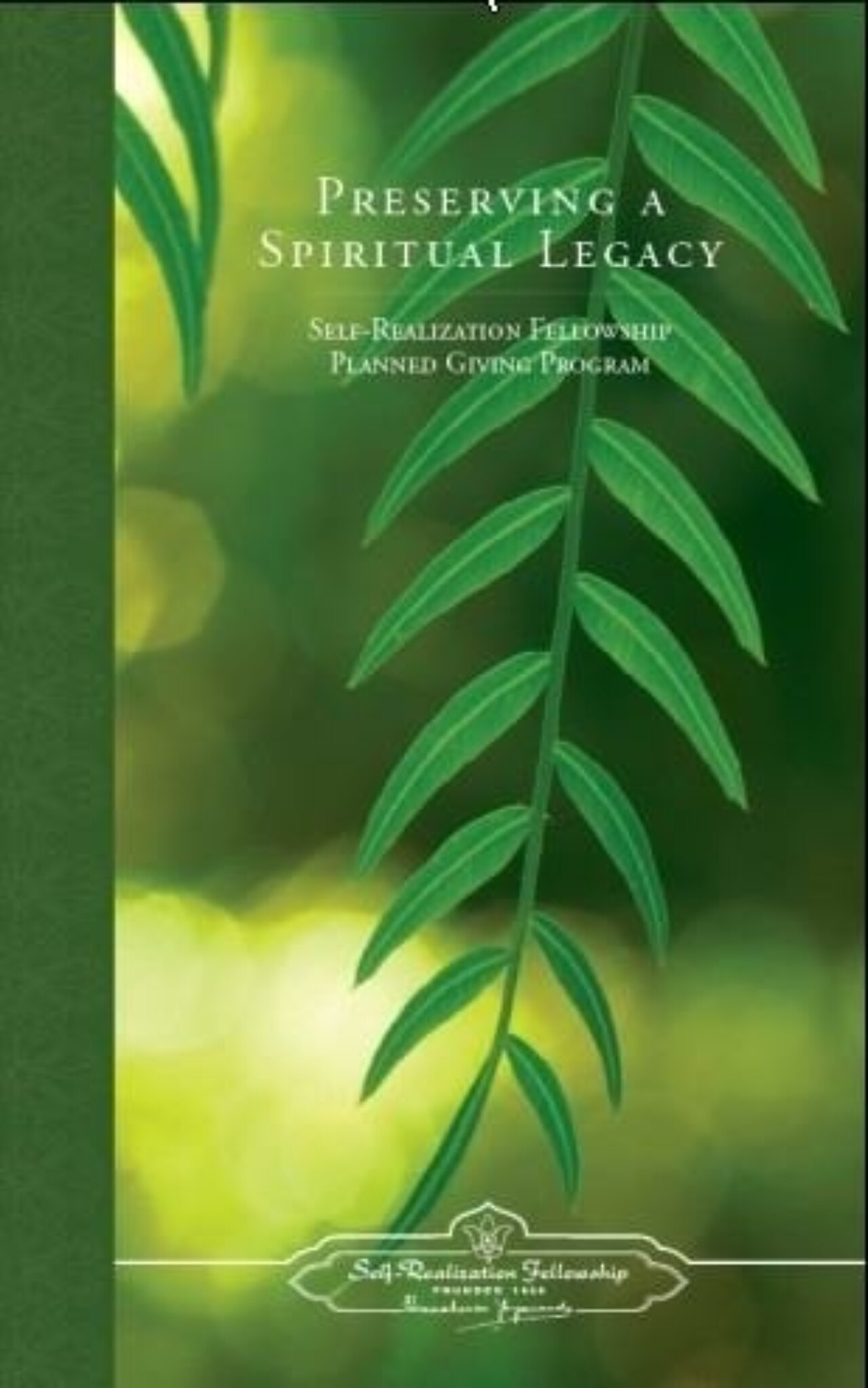Making a Difference
For more than a century, Self-Realization Fellowship has been the fortunate recipient of the generosity of its devoted members and friends. The society’s growth and its ability to carry on the worldwide spiritual work of its founder, Paramahansa Yogananda, are due in large part to these charitable bequests.
Planned giving is a way to experience the joy that comes from participating in a worldwide sacred vision for the upliftment of humanity, by helping to ensure that the goals of Self-Realization Fellowship continue to be met. Planned giving also helps the donor to maximize the personal benefits of his or her charitable gifts (such as tax savings, increased income, and sound estate planning), and allows for the contribution of gifts that otherwise might have been thought not possible.

Types of Planned Gifts
Planned giving is about "tax-wise" philanthropy. The goal of the planned gifts discussed below is to enable you to minimize the cost of giving, while maximizing the benefits for yourself, your family, and Self-Realization Fellowship. Planned gifts include traditional gifts such as bequests, as well as those you might not normally consider, such as gifts of life insurance, real property, and retirement plan assets.
Bequests
A bequest to SRF made in a will or a living trust allows you to make a substantial contribution without diminishing the assets available to you during your lifetime. Most gifts by will or living trust are either specific, general, or residuary bequests. A specific gift is a donation of a particular piece of real property, stock, or other clearly identified asset(s).
A general bequest usually takes the form of a specific dollar amount given to SRF. A residuary bequest generally involves a specific portion or percentage of the entire estate that is paid to the residuary beneficiary after all specific bequests have been satisfied. A bequest is deductible for federal estate tax purposes, and there is no limit on the amount of the estate tax charitable deduction. In addition, bequests generally are not subject to state inheritance taxes.
You can make a bequest to SRF by creating a new will, adding a codicil (appendix) to your present will, or including SRF in your revocable trust.
Charitable Remainder Trust
Charitable remainder trusts (CRTs) are gift arrangements that enable you to receive an income from the trust for yourself and/or another beneficiary for life or a term of years; at the end of the trust term, a CRT that names SRF as the remainder beneficiary will distribute the assets of the trust to SRF CRTs are irrevocable trusts, and they can be funded with cash, real estate, publicly traded stocks and bonds, or other types of assets. There are two types of CRTs: charitable remainder annuity trusts and charitable remainder unitrusts. A charitable remainder annuity trust offers the income beneficiaries a fixed annual income stated as a flat dollar amount or as a percentage of the value of the initial trust assets. A charitable unitrust provides a variable annual payment, based on a percentage of the trust assets (not less than 5%) as revalued annually.
By setting up a CRT for the benefit of SRF, you can realize benefits as well, as follows:
- Annual income for yourself and/or other beneficiaries
- Immediate federal income tax deduction
- Elimination of capital gains taxes on the transfer of appreciated property
- Estate tax savings
- Gift to SRF of the remainder interest in the trust property
Charitable Lead Trust
A charitable lead trust (CLT) that names SRF as the income beneficiary will provide SRF with an annual income during the term of the trust. At the end of the trust term, the assets of the trust pass to the beneficiaries named in the trust.
You can fund a CLT with publicly traded securities, income-producing real estate, partnership interests, or a combination of the above.
The benefits you receive from a CLT include:
- Charitable gift tax deduction for the present value of the annual trust payments to SRF
- No tax to you on any income earned by the trust
- No capital gains tax on appreciated property transferred to the trust
- Elimination of gift or estate tax on any appreciation in the assets during the term of the trust
Life Insurance
You can donate a life insurance policy to SRF or simply name SRF as the beneficiary to receive the insurance proceeds. For a gift of a paid-up policy, you will receive an income tax deduction equal to the lesser of the cash value of the policy or the total premiums paid. To qualify for the federal charitable contribution deduction on a gift of an existing policy, you must name SRF as owner and beneficiary.
Retirement Plan and IRA Assets
Using your retirement plan as a gift vehicle can be a tax-efficient way to fund part or all of your bequest to SRF because your interest in retirement plans that remain in your estate are often subject to both estate and income taxes when received by your heirs. In the case of a large estate, the effective combined tax rate on a retirement plan may exceed 70 percent. You can name SRF as the beneficiary or contingent beneficiary of your IRA, Keogh, 401(k), tax-deferred annuity, or other qualified plan. Because SRF is tax-exempt, beneficial ownership of the plan passes from you to SRF upon your demise without any income tax or estate tax.
Retained Life Estate
You can donate your home, vacation home, or farm to SRF while retaining the right to live in it for the rest of your life (and your spouse's life) or for a term of years. Your donation will qualify for a federal income tax deduction, up to 30 percent of your adjusted gross income. You may take unused deductions over the next five years.
While you retain the right to live on your property, you continue to be responsible for all routine expenses, including maintenance fees, insurance, property taxes, repairs, etc. If you later decide to vacate your property, you may rent the property to someone else, or sell the property in cooperation with SRF.
Additional Forms and Information
Please Contact the Office of Planned Giving below if you have additional questions
The Self-Realization Fellowship Office of Planned Giving, staffed by legal professionals, is prepared to work with you and your advisors to explain the gift options offered under our Planned Giving Program. If you are interested in learning more about the Planned Giving Program, please contact the Office of Planned Giving at the International Headquarters of Self-Realization Fellowship:
Self-Realization Fellowship
Office of Planned Giving
3880 San Rafael Avenue
Los Angeles, CA 90065
Tel: 323-276-5656 Fax: 323-276-5612
Email: plannedgiving@yogananda-srf.org
Request Information
Questions about donation options?
Please contact us if you would like assistance or more comprehensive information. In addition, you are welcome to contact us to discuss the gift options we have available:
Self-Realization Fellowship
Office of Planned Giving
3880 San Rafael Avenue
Los Angeles, CA 90065
Tel: 323-276-5656 Fax: 323-276-5612
Email: plannedgiving@yogananda-srf.org
It is through your support that Self-Realization Fellowship will be able to continue the legacy of Paramahansa Yogananda and bring new hope and inspiration to receptive hearts through his sacred teachings. May God bless you for helping us to serve all who are striving for a closer relationship with Him, and to contribute to greater peace, understanding, and unity among the human family.



